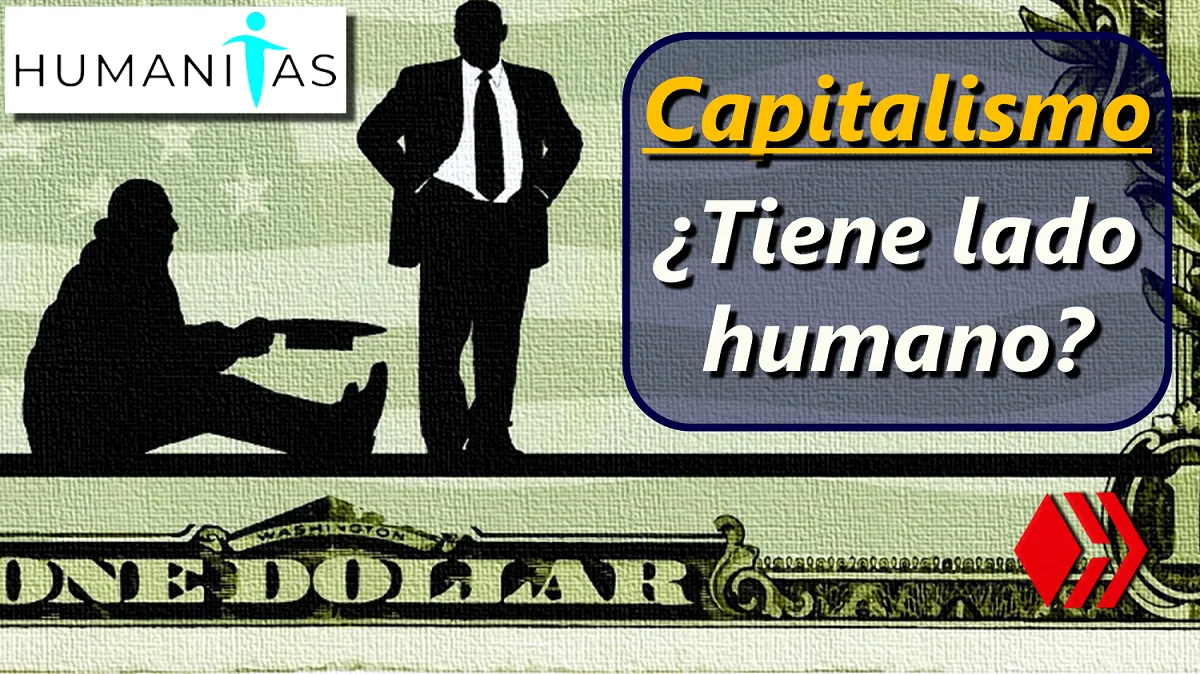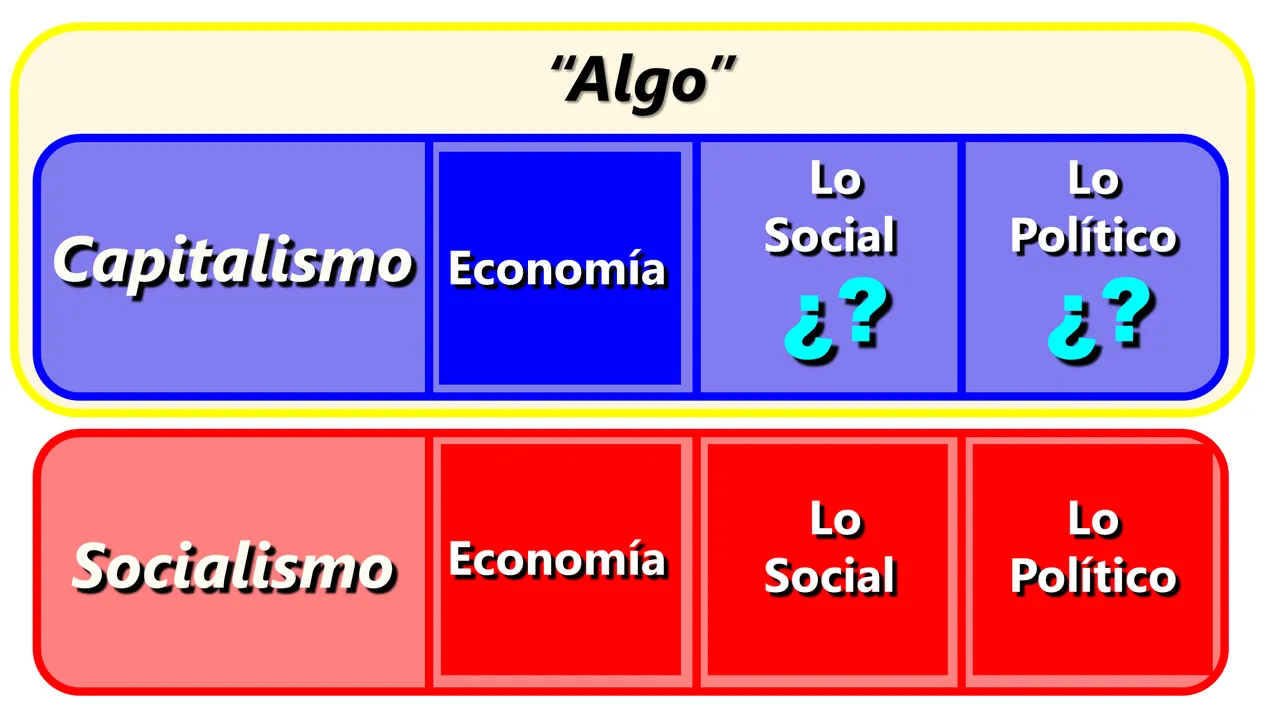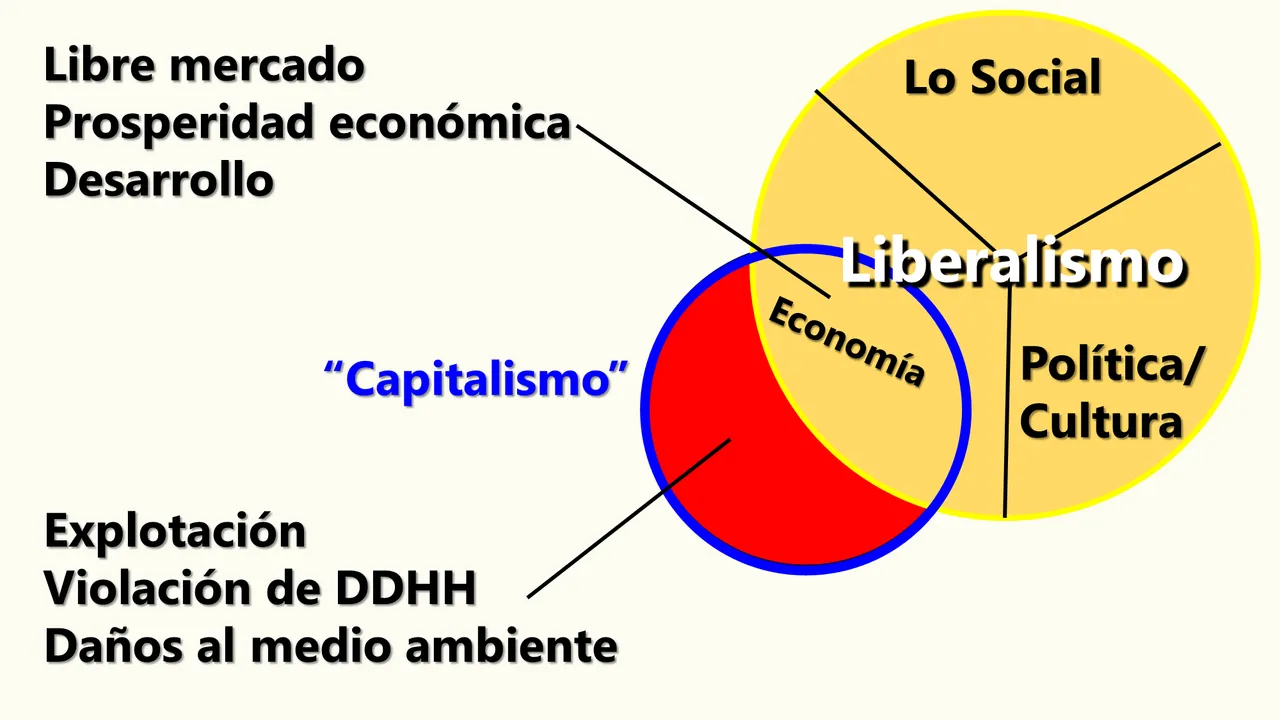Capital y capitalismo. No leemos o no percibimos lo humano por ninguna parte en estas palabras ¿Es el capitalismo un sistema inhumano? En esta publicación trataremos de averiguarlo.
En la comunidad #Humanitas hay espacio para discutir ideas relacionadas a lo humano. No solamente podemos abordar temas socio-económicos desde el punto de vista humano, sino que estos temas en sí ya son parte de las humanidades. Puedes visitar este post si quieres conseguir ideas sobre qué podrías publicar en esta comunidad.

Todos alguna vez hemos leído o escuchado interminables discusiones o debates sobre el tema. Ya sea en un salón de clase o en una reunión de amigos o familia, diferentes visiones pueden chocar en una sola palabra, la cual debemos o deberíamos analizar o utilizar con cuidado. Creo que la mayoría de las diferencias de opinión se deben a que no se tiene consciencia suficiente acerca de la historia detrás de la palabra “capitalismo”.
Primero que nada, debemos empezar por el término en sí. El término “capitalismo” no fue inventado o acuñado por alguien a favor del sistema mismo. Fue una forma de Karl Marx de referirse a un sistema donde hay capital, y para referirse a él de forma crítica. Puede que otros autores hayan utilizado el término antes, pero se empezó a difundir al mundo a partir de las obras de Marx.
Es decir, el término empezó a utilizarse ya de por sí con cierta “carga despectiva”, y con el tiempo fue adoptado también por los que se oponían a las ideas de Marx, aunque conceptualmente no sería del todo correcto.

Aquí nos encontramos con un problema de perspectiva grave en una sociedad. Cada vez que se habla del capitalismo sus detractores entienden una cosa y sus defensores no necesariamente defienden eso que los primeros denuncian. En este panorama hay pocas posibilidades de entendimiento.
¿Tiene el “capitalismo” un “lado humano”?
Si nos vamos a la palabra en sí pues evidentemente no vemos mucho de humanidad. Significaría algo así como “el capital por el capital”, el objetivo de acumular capital por encima de cualquier otra cosa. Es evidente que hay poca importancia de los valores humanos en esta visión.
Pero como hemos mencionado antes, se ha adoptado la palabra “capitalismo” para referirnos a “algo”, que en teoría es opuesto a las ideas de Marx, de socialismo o comunismo. Pero ese “algo” no es necesariamente una visión inhumana.
Cuando se suele hablar de “capitalismo” se habla más allá del capital, es evidente que sí hay un lado humano, solo que este queda “opacado” por toda la carga despectiva del término. Quizás “capitalismo” no es la palabra adecuada a utilizar para referirnos a la visión o idea de sociedad que queremos referirnos, cosa que va más allá de lo económico y sí va hacia lo humano.

Problema de perspectiva… Si no es “capitalismo” ¿Qué es?
Imagínate por un segundo que hablamos del agua. El agua sirve para hidratarnos, lavar, y muchas otras cosas útiles. Pero el agua también puede hacernos daño, ya que puede ahogarnos o generar inundaciones. Unos podrían preocuparse mucho por las inundaciones y le tienen cierto rechazo al agua, otros podrían pensar en el agua como algo sagrado, ya que sin ella no pueden vivir. Es evidente que ambos grupos hablan de lo mismo, pero no pueden ponerse de acuerdo porque no se dan cuenta que son perspectivas distintas respecto al agua.
Lo anterior quizás sea un ejemplo muy vago, pero algo así es lo que a mi parecer sucede con la palabra capitalismo.
El capitalismo sería algo únicamente en el plano económico, mientras que el socialismo es un término que abarca también lo social y político. Si diferenciamos estas 3 áreas nos damos cuenta que si utilizamos la palabra “capitalismo” estamos de alguna forma excluyendo áreas importantes de lo humano (la cultura, por ejemplo…).
El modelo o visión en la cual se podría incluir al capitalismo como modelo económico y que también abarca aspectos de lo social y cultural sería el liberalismo. Sin embargo, esta palabra es menos utilizada o conocida, pero con ella si hablaríamos de una filosofía o doctrina que toma en cuenta el ser humano y sus libertades, el respeto por otros seres humanos.

Capitalismo y liberalismo no son exactamente lo mismo, pero se suele utilizar el primer término para referirse a lo segundo. Pero, desde otro punto de vista, la palabra "capitalismo" también se usa por sus detractores para referirse a aspectos negativos que no necesariamente están dentro de la filosofía del liberalismo.
Bajo ciertas condiciones y distorsiones generadas por el Estado, el "capitalismo" (entre comillas) se vuelve beneficioso para grandes empresas y corporaciones en detrimento del trabajador (lo que denunciaba Marx). Por otro lado, el liberalismo aboga más por las pequeñas empresas, la descentralización, y que el trabajador sea también propietario. Es decir, ambas visiones se preocupan por el ciudadano de a pie, y hasta en el fondo podría decirse ambas están en contra de lo mismo (a muy grosso modo...).
Aquí ya podríamos hablar de qué diferentes visiones o ramas tiene el liberalismo, pero queda claro que cuando hablamos comúnmente de “capitalismo” (en el sentido positivo), en realidad estamos hablando de algo que sí toma en cuenta al ser humano y no lo ve como una mercancía o un objeto. El problema es, como ya dijimos, que se tiene poca consciencia del trasfondo de la palabra, por lo cual se da paso a poco entendimiento. Además, las ideas de Marx en la actualidad tienen un gran poder en la cultura, la educación, la sociedad, etc., por lo que utilizar la palabra “Capitalismo” es quizás darle un poco de razón al filósofo alemán.

Como reflexión final, más allá de etiquetas que pueden dividirnos, lo importante es lo humano. Algunos piensan más en lo “social”, el bien común, otros piensan más en lo “libre”, la libertad. Ambas cosas son deseables, pero el reto del ser humano es lograr ambas cosas estando de acuerdo en el camino para lograrlo ¿Crees que sea posible?
Espero que hayas disfrutado de esta lectura. Quizás pueda ser del interés de usuarios como @greengalletti @irvinc @alexandermoreno @soldierofdreams quienes pudieran aportar ideas valiosas.
De igual manera, si estás leyendo esto, estás invitado a participar en la iniciativa en curso en la comunidad Humanitas: Iniciativa: Cultura Humana Semana 6: Historia.
English version
Capital and capitalism. We do not read or perceive the human in these words. Is capitalism an inhuman system? In this publication we will try to find out.
In the #Humanitas community there is space to discuss ideas related to the human. Not only can we address socio-economic issues from a human point of view, but these issues themselves are already part of the humanities. You can visit this post if you want to get ideas about what you could publish in this community.
We have all read or heard endless discussions or debates on the subject. Whether in a classroom or a gathering of friends or family, different views may clash on a single word, which we must or should analyze or use with care. I believe that most of the differences of opinion are due to not having enough awareness about the history behind the word "capitalism".
First of all, we should start with the term itself. The term "capitalism" was not invented or created by someone in favor of the system itself. It was Karl Marx's way of referring to a system where there is capital, and to refer to it critically. Other authors may have used the term before, but it began to spread to the world from Marx's works.
That is to say, the term began to be used already with a certain "derogatory charge", and with time it was also adopted by those who opposed Marx's ideas, although conceptually it would not be entirely correct.

Here we are faced with a serious problem of perspective in a society. Every time capitalism is discussed its detractors understand one thing and its defenders do not necessarily defend what the former denounce. In this panorama there is little chance of understanding.
Does "capitalism" have a "human side"?
If we go to the word itself, then obviously we do not see much of humanity. It would mean something like "capital for capital's sake," the goal of accumulating capital above all else. Clearly there is little importance of human values in this vision.
But as we have mentioned before, the word "capitalism" has been adopted to refer to "something," which in theory is opposed to Marx's ideas of socialism or communism. But that "something" is not necessarily an inhuman vision.
When we usually speak of "capitalism" we speak beyond capital, it is evident that there is a human side, only that this is "overshadowed" by all the derogatory charge of the term. Perhaps "capitalism" is not the right word to use to refer to the vision or idea of society that we want to refer to, something that goes beyond the economic and goes towards the human.

Problem of perspective... If it is not "capitalism" what is it?
Imagine for a second that we are talking about water. Water is useful for hydration, washing, and many other useful things. But water can also harm us, as it can drown us or generate floods. Some may worry a lot about floods and have a certain rejection of water, others may think of water as something sacred, since they cannot live without it. It is evident that both groups are talking about the same thing, but they cannot agree because they do not realize that they have different perspectives on water.
The above is perhaps a very vague example, but something like that is what I think is happening with the word capitalism.
Capitalism would be something only on the economic level, while socialism is a term that also encompasses the social and political. If we differentiate these 3 areas we realize that if we use the word "capitalism" we are somehow excluding important areas of the human (culture, for example...).
The model or vision in which we could include capitalism as an economic model and which also encompasses aspects of the social and cultural would be liberalism. However, this word is less used or known, but with it we would speak of a philosophy or doctrine that takes into account the human being and his freedoms, the respect for other human beings.

Capitalism and liberalism are not exactly the same thing, but the former term is often used to refer to the latter. But, from another point of view, the word "capitalism" is also used by its detractors to refer to negative aspects that are not necessarily within the philosophy of liberalism.
Under certain conditions and distortions generated by the State, "capitalism" (in quotation marks) becomes beneficial for large companies and corporations to the detriment of the worker (what Marx denounced). On the other hand, liberalism advocates more for small businesses, decentralization, and that the worker is also the owner. That is to say, both visions are concerned about the ordinary citizen, and even in the end it could be said that both are against the same thing (in a very rough way...).
Here we could talk about the different visions or branches of liberalism, but it is clear that when we commonly speak of "capitalism" (in the positive sense), we are really talking about something that does take into account the human being and does not see him as a commodity or an object. The problem is, as we have already said, that there is little awareness of the background of the word, which gives way to little understanding. Moreover, Marx's ideas currently have great power in culture, education, society, etc., so that to use the word "Capitalism" is perhaps to give a little reason to the German philosopher.

As a final reflection, beyond labels that can divide us, the important thing is the human. Some think more of the "social", the common good, others think more of the "free", freedom. Both are desirable, but the challenge of the human being is to achieve both while agreeing on the way to achieve it Do you think it is possible?.
I hope you enjoyed this reading. Perhaps it might be of interest to users like @greengalletti @irvinc @alexandermoreno @soldierofdreams who could contribute valuable ideas.
Likewise, if you are reading this, you are invited to participate in the ongoing initiative in the Humanitas community: Initiative: Human Culture Week 6: History.
I hope you enjoyed this reading. Leave your comment or opinion.
Translated to English language with the help of DeepL.com
Otras redes sociales:
 |
 |
 |
 |
F1 & motorsports: @acontmotor
 |
 |
 |
 |
| ¡Gracias por visitar! — ¡Thanks for visiting!  |